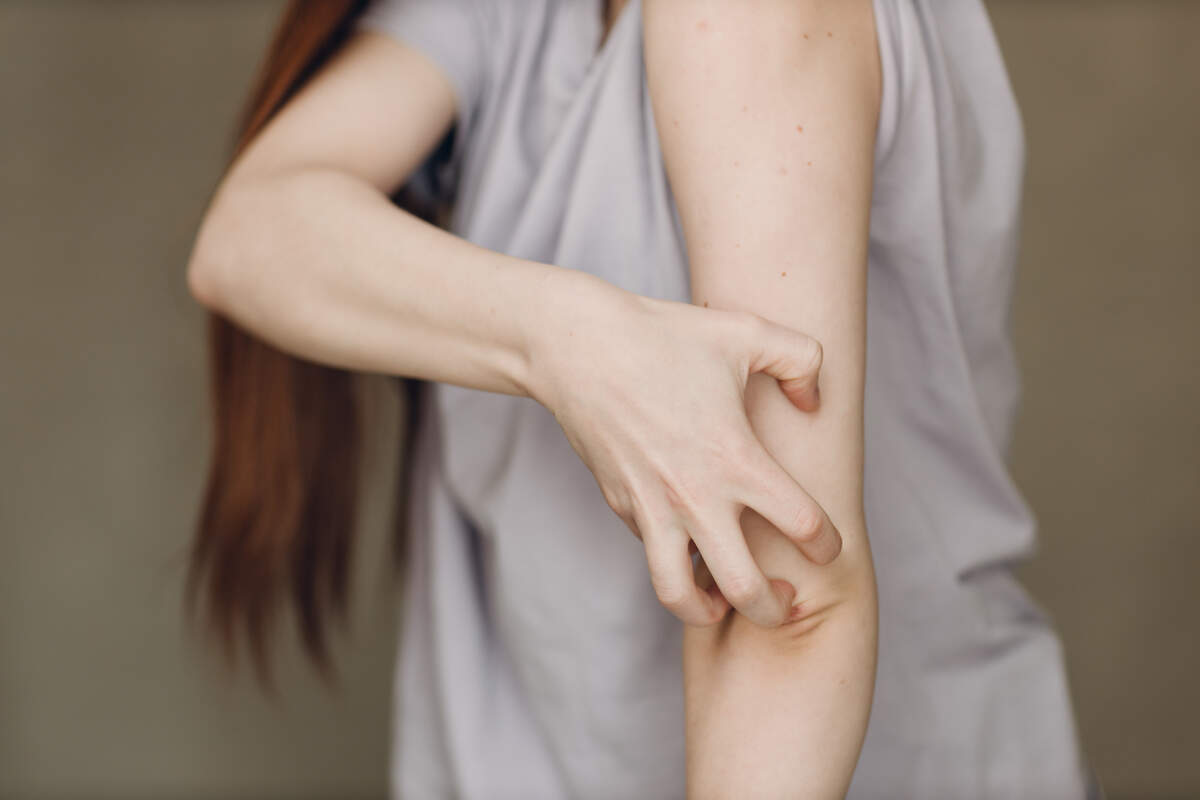Last Updated on September 27, 2023 by Neelam Singh
40k. That’s how much 43 year-old Gautami Mishra has spent on the treatment of skin allergies since 2019. Frequent visits to dermatologists, ointments, medicated body washes — nothing has helped her. Her palms and elbows are always dry, scaly, and itchy, accompanied by rashes and blisters. A severe bout every now and then ends up reaching her eyelids, thighs, and legs. Her skin condition is known as dermatitis.
Skin allergies are increasingly prevalent among people today, with a multitude of factors contributing to this concerning trend. Water, climate, pollution and pets, and atopy make some people vulnerable to skin reactions like these.
Is it in the air?
Last year, specialists in Delhi issued a warning about possible skin harm from poisonous air. They claimed that because pollutants impact skin barriers, there is a higher risk of allergies and acne flare-ups.
According to doctors in Bangalore, windy weather can aggravate allergies, particularly common ones like dust and pollen allergies. The harsh water in the city can also dry up the skin, making it more sensitive and susceptible to allergies. This is due to the fact that using a lot of soap in addition to hard water might upset the skin’s normal bacterial balance.
As an atopic person with a hereditary susceptibility to developing allergy illnesses, Mishra’s body reacts to allergens inhaled or consumed with a heightened immune response. The condition is further exaggerated by Bangalore’s fluctuating weather and hard water. The condition deteriorated, particularly during COVID-19, due to frequent handwashing. “There comes a time when I develop minor gashes that start to hurt. I try to keep my hands moisturised, but sometimes I just forget or move from one chore to another. The fact that I have two pets, which means I have to keep washing my hands, also plays a role. What I have understood is that you can keep it under control, but it doesn’t go away, and there can be periodic flare-ups. It’s not possible to keep visiting dermatologists,” explains Mishra.
Climate change has a role to play

Dr. Shraddha Kololgi, Consultant Dermatologist, Ramkrishna Hospital, Bengaluru, points out that eczema is becoming a more common occurrence among people. Conditions like eczema, often referred to as atopic dermatitis, are frequently observed in children.
“Eczema has indeed become increasingly common, possibly due to product adulteration and heightened allergen exposure. Moreover, climate change seems to be a contributing factor in the rising incidence of skin allergies. Changing weather patterns can significantly impact the prevalence of allergies related to dust, pollen, and sunlight, making them more frequent concerns.”
Mumbai-based interior designer Anamika Tomar has been battling Rosacea for a long time. It is a chronic inflammatory skin condition that typically affects the nose and cheeks and results in flushed skin and a rash. At times, the face’s blood vessels become visible too. The condition is triggered by exposure to the sun and emotional stress. “My job is an outdoor one in which I am exposed to the sun, dust, extreme heat, and cold. When that happens, the skin vessels get dilated,” says Tomar.
Since Rosacea can’t be cured, efforts should be made towards preventing it. Tomar always carries along wet wipes, rosewater, and a chill pad to cool down her skin. She also wears hat and applies prescribed creams. Rosacea also means no make-up for Tomar. “I just apply some tinted creams suggested by the doctor. Lifestyle habits like food, smoking, drinking, and pets also trigger it, but I can’t give away my cat, and other habits, so I take care of my skin. At times I also take a prescribed tablet,” expresses Tomar.
Understand the root cause

Doctors advise targeting the root cause rather than tackling the symptoms. “When dealing with intense itchiness, anti-itch tablets can offer relief, but it’s crucial to tackle the underlying cause. Individuals should avoid everyday allergens that trigger their reactions. When venturing outside, it’s essential to safeguard the skin by using moisturizing creams and sunscreen. It’s noteworthy that these ointments are generally budget-friendly, as they fall into the category of medical products rather than cosmetics,” emphasises Dr. Vijaya Gowri Bandaru, Visiting Consultant – Dermatology, Sakra World Hospital, Bengaluru.
Apart from sunlight, people develop allergies to cosmetics, perfumes, deodorants, hair removing creams, and dyes as well. Ever since Supriya Peterson developed a thyroid condition in 2008, her skin has become intolerant to perfumes, deodorants, or, for that matter, any kind of spray. Last month, when she had terrible back pain, she used a back pain spray to get some relief. “I developed skin rashes, which started to itch and hurt badly. I had to rush to a dermatologist and found some relief,” recalls Delhi-based Peterson. “Since there is no permanent cure for this condition, I need to be extra cautious about it,” she adds.
Going further, the widespread use of harsh cleaning products and sanitisers, especially during the COVID-19 pandemic, has disrupted the skin’s natural balance and led to increased skin sensitivity and allergies. The excessive use of cosmetics and skincare products, some of which may contain allergenic ingredients, is likely to contribute to skin-related issues as well.
Modern diets filled with processed foods, preservatives, and additives can further aggravate skin allergies. Poor dietary choices can weaken the immune system and compromise the body’s ability to defend against allergens. Lastly, genetic predisposition plays a role, as individuals with a family history of skin allergies are more likely to develop similar conditions.
The rise in skin allergies can be attributed to a complex interplay of lifestyle factors, environmental changes, and genetics. As these factors continue to evolve, it is crucial for individuals to take proactive measures to protect their skin. Avoid home remedies and seek medical guidance when necessary to manage and treat skin allergies effectively.
Disclaimer: Medical Science is an ever evolving field. We strive to keep this page updated. In case you notice any discrepancy in the content, please inform us at [email protected]. You can futher read our Correction Policy here. Never disregard professional medical advice or delay seeking medical treatment because of something you have read on or accessed through this website or it's social media channels. Read our Full Disclaimer Here for further information.

